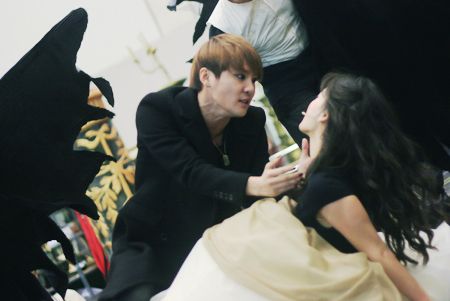[TRAD ESP] La Muerte (Tod), Kim Junsu, domina el escenario con su única presencia.
Cuando los Ángeles de la muerte con cabellos rubios y negras alas bailan
su aterradora y bella danza,
“él” aparecerá sin falta. Sus dulces palabras de tentación con una melodía de
ensueño susurrada que agita y penetra a través del corazón de los oyentes. Como
un demonio, mientras que su tibio susurro “Solamente yo puedo entenderte” Se
empapa a través de tu frío y solitario corazón, se roba tu alma.
El enfoque principal en la historia del musical “Elisabeth” es el
personaje de la Reina Elisabeth pero inesperadamente, el que se encuentra en el
fondo de la historia es la “Muerte”. Teniendo una niñez sin restricciones pero
después de un acontecimiento dramático, la libertad de la Reina Elisabeth de
Austria le fue arrebatada, siendo manipulada, viviendo una vida como títere. El destino de Elisabeth fue que su alma fuese
amarrada invisiblemente pudiendo ser vista como una marioneta en un espectáculo
de títeres y el que tiene control sobre la cohibida alma de la Reina es de
hecho “La Muerte”.
El compositor del musical, Sylvester Levay explicó acerca de “La muerte”
en una entrevista “Es un encantador personaje que seduce a la audiencia”
Además, “él es tan encantador que les dá a la audiencia una fuerte intensidad
sacudiéndoles el miedo a la muerte” Sylvester Levay también compartió una
conmovedora anécdota. “Había una chica que estaba enferma y le tenía miedo a la muerte pero después de haber
visto el musical, ha ganado de nuevo los deseos de vivir una vida feliz.
Al igual
que lo ha dicho Sylvester Levay , el encanto de la “Muerte” en éste musical es
fatal. Cómo representar a tal personaje que no es humano, bestia, ángel o
incluso demonio?! Con los pies tan rápidos como un águila escondida y pasos tan
sensuales como un leopardo asesino, el se acerca y clava su daga hasta el vital
punto de su meta.
Mientras
que un
animal mueve su cuerpo con el fin de cazar a
su presa, la “muerte” y sus ángeles bailan una atractiva danza con el
fin de poner para siempre el amor de su objetivo en la mano de la “Muerte”. La fascinante
danza entre la parte que seduce – La “Muerte” y los ángeles de la muerte - y la
parte que trata de escapar – Elisabeth – es paradójicamente, es muy bello y magnífico. No sólo Elisabeth sino incluso la audiencia
siente su baile.
El
aspecto indefinible también es un punto
interesante de la multicolor "Muerte". Particularmente, las canciones
de la “Muerte” están llenas de varios aspectos. En el día de la boda de
Elisabeth y Joseph, él canta “Eres sincero con tu elección? Tú ensueño sobre él
es sólo una ilusión”, entonces grita locamente “El último baile. Mi último baile. Bailaré contigo al final. Tú solamente
eres mía” y aparecen los locos celos de un “hombre que se siente enamorado”. Sin embargo, al tiempo que exige el hijo de Elisabeth –
Rudolf se rebela “Qué hay para dudar. Estas al rescate del mundo. Ahora mismo,
éste es el destino. Sólo tú puedes rescatar a éste mundo que se derrumba”, él
es un “demonio” que juega con la esperanza de la vida.
El
musical no construye ninguna restricción para la “Muerte”. Viniendo de la
deprimente sensibilidad de Elisabeth, su presencia simbólica también cambia con
el estado mental de Elisabeth; en un momento el puede llenar su soledad con
amor pero en el siguiente momento, él quiere desesperadamente poner en libertad a cada
cadena de la esperanza. Él es una sombra que sigue a Elisabeth sin fin. También,
es razonable que él le diga a Elisabeth “Sólo yo puedo entenderte y darte la
libertad”. La “Muerte” no es otra cosa que otro yo de Elisabeth que ella
inventó con el fin de expresar la irresistible codicia oscura.
Tener
la posibilidad de conocer 3 diferentes actores con 3 diferentes colores de la “Muerte”
en escena es otro disfrute no convencional del musical “Elisabeth”. Teniendo
diferentes personalidades, Ryu Junghan, Kim Junsu y Song Changeui dan diversas
interpretaciones con su propios encantos a la “Muerte”.
Especialmente,
la “Muerte” Kim Junsu ha recivido monetarios favorables de parte de la
audiencia y domina el escenario con su presencia única. Más joven que los otros
dos actores, él le ha dado un inesperado encanto a la interpretación como
respuesta a las dudas sobre cómo iba a interpretar
a un personaje no humano. Simplemente como un personaje sensual y varonil, mientras
que en la formación de un triángulo amoroso con el emperador Joseph y la reina
Elisabeth, el se convierte en un “peligroso ser” el cual no es mujer, hombre o
espíritu y por encima de ese peligroso límite, el revela su mortal belleza.
Siendo neutral entre mujer y hombre, a veces susurrando en
un tono alto, a veces susurrando en un tono bajo, el seductor Kim Junsu va y
viene en ambos lados y sorprende a la audiencia con su doble voz que crea una
inteligente combinación. No perteneciendo a ningún área en particular, él agrega su sensibilidad única en la
atracción bisexual de lo trascendente la "Muerte" quien atrae a
cualquier cosa, y revivió el atractivo personaje.
Traducido al español por: Dolphins Ann
Compartido por: JYJ3 + Toxic Xiah
Por favor no agregar, alterar o remover los créditos.
Compartido por: JYJ3 + Toxic Xiah
Por favor no agregar, alterar o remover los créditos.
****************************************************************************************
Kim Junsu’s ‘Death (Tod)’ dominates the stage with his unique
presence.
Whenever the Angels of Death with blonde hair and black wings dance their
terrifyingly beautiful dance, ‘he’ will appear without fail. His sweet words of
temptation with a dreamy whispered melody agitate and pierce through the
listener’s heart. Like a devil, while his warm whisper ‘Only I can understand
you’ is soaking through your cold and lonely heart, he steals your soul
away.
The main focus in the story of musical ‘Elisabeth’ is the character Queen
Elisabeth but unexpectedly, the one standing in the background of this story is
‘Death’. Having an unrestrained childhood but after a dramatic happening, Queen
Elisabeth of Austria had her freedom snatched away and lived a life of a
manipulated puppet. The fate of Elisabeth whose soul was tied up invisibly can
be seen as a hanging marionette in a puppet show and the one who controls over
the restrained soul of the Queen is indeed ‘Death’.
The composer of the musical, Sylvester Levay explained about ‘Death’ in
an interview ‘A charming character who seduces the audience’. In addition, ‘He
is so charming that he gives the audience a strong strength to shake off the
fear of death.’ Sylvester Levay also shared a touching anecdote ‘There was a
girl who was sick and afraid of death but after watching the musical, she
gained back the desire to live a happy life.’ Just like what Sylvester Levay
has said, the allure of ‘Death’ in this musical is fatal. How to portray such a
character which is not human, beast, angel or even devil?! With the feet as
fast as a hidden eagle and footsteps as sensual as a killer leopard, he comes
closer and stabs his dagger to the vital point of the target.
While a beast moves its
body in order to hunt for prey, ‘Death’ and his Angels dance their appealing
dance in order to put the target’s forever love into Death’s hand. The
fascinating dance between the party who seduces – ‘Death’ and the Angels of
Death- and the party who tries to escape – Elisabeth- is paradoxically
extremely beautiful and magnificent. Not only Elisabeth but even the audience
fell for his dance.
Indefinable appearance is also an interesting point of the
multicoloured ‘Death’. Particularly, the songs of ‘Death’ are also
filled with various aspects. On the wedding day of Elisabeth and Joseph,
he sings “Are you sincere with your choice? Your reverie about him is
just an illusion”, then shouts out crazily “The last dance. My last
dance. I will dance with you in the end. You are only mine” and shows
the insane jealousy of a ‘man who fell in love’. However, while
demanding Elisabeth’s son- Rudolf to rebel “What is there to hesitate.
You are rescuing the world. Right now, this is fate. Only you can rescue
this collapsing world”, he is an ‘evil’ who is playing with the hope of
life.
The musical doesn’t build any restriction for ‘Death’. Coming from
the depressing sensibility of Elisabeth, his symbolic presence also
changes with Elisabeth’s state of mind; one moment, he would fill up her
loneliness with love but the next moment, he desperately wants to set
free every string of hope. He is a shadow who follows after Elisabeth
endlessly. Also, it might be reasonable that he said to Elisabeth “Only I
can understand you and give you the freedom”. ‘Death’ is no other than
another self of Elisabeth that she invented in order to express the
irresistible dark greed.
Being able to meet 3 different actors with 3 different colours of
‘Death’ on stage is another unconventional enjoyment in the musical
‘Elisabeth’. Having different personalities, Ryu Junghan, Kim Junsu and
Song Changeui diversely interpret their own charming ‘Death’.
Specially, Kim Junsu’s ‘Death’ has received favourable comment from
the audience and dominated the stage with his unique presence. Younger
than other two actors, he has given an unexpected charming
interpretation in response to the doubts about how he would portray a
nonhuman character. Simply as a sensual and manly character, while
forming a love triangle with the Emperor Joseph and Queen Elisabeth, he
becomes a ‘dangerous being’ which is not woman, man, human or spirit and
above that dangerous boundary, he reveals his deadly beauty.
Being neutral in between woman and man, sometimes in whispering high
tone, sometimes in low tone, the seducing Kim Junsu goes back and forth
in both sides and surprises the audience with his dual voice which
creates a clever combination. Not belonging to any particular area, he
added his unique sensibility into the bisexual allure of the
transcendent ‘Death’ who attracts anything, and revived the appealing
character.



No hay comentarios:
Publicar un comentario